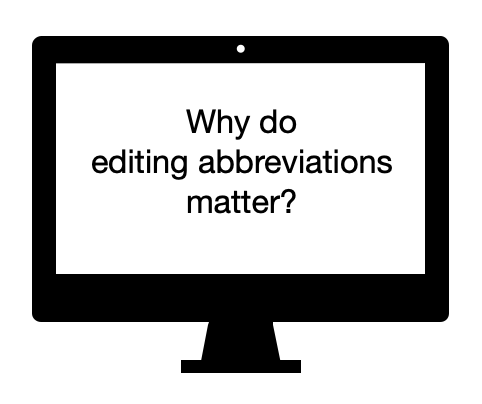
I thought I’d write a blog post about editing abbreviations, including Latin versions that are often misused. The background (etymology) of these abbreviations is quite interesting, especially for those of us who work in the world of words. No matter your field or subject matter, it’s good to present your work in professional manner.
These tips should help, and you can see Part 2 here.
Editing Abbreviations in Alphabetical Order
Below are abbreviations we use frequently. Note that when the abbreviation is spelled out in non-English, it’s usually italicized unless the word has become “Anglicized” over time. It’s always best to check a style guide when in doubt.
Note also that the periods and capitalization should be used as shown regardless of where they are placed in a sentence.
- ad lib or ad-lib — ad libitum | spontaneously, without prior practice, unrestrained
- ad lib. — ad libitum | at one’s pleasure (to take a medicine or use a treatment as often as one wishes)
- a.m. — ante meridiem | before midday (the hours from 12 a.m. midnight to 11:59 a.m.) **often misspelled as meridian
- A.D. — anno Domini | in the year of our Lord (used with all years after Jesus’ birth; Dionysian Era usage as opposed to the Common Era)
- B.C. — before Christ | anything that happened before A.D. 1 (Dionysian Era usage as opposed to the Common Era)
- BCE — before the Common Era | used when avoiding the religious/Dionysian Era “B.C.” or “A.D.”
- ca. or c. — circa | around, approximately, not exact (indicates a point in time such as ca. 1900s)
- CE — Common Era | used when avoiding the religious/Dionysian Era “B.C.” or “A.D.”
- C.V. — curriculum vitae | course of life (summary of a person’s education, work history, job qualifications; similar to a resume)
- e.g. — exempli gratia | for example
- et al. — et alii | and others, and other people (not inanimate object or non-living things)
- etc. — et cetera | and others, and the rest (referring to inanimate objects and non-living things rather than people)
- ibid — ibidem | in the same place — used in endnotes or footnotes when referencing a previously cited source (same page numbers)
- i.e. — id est | that is to say, what that means is
- lb. — libra | pound, measure of weight/mass
- p.m. — post meridiem | after midday (the hours from 12 p.m. noon to 11:59 p.m.)
- re — res | in the matter of (referring to the primary matter of interest)
- Rx — recipere | to take (referring to medication prescribed by a physician)
- stat — statim | immediately (immediate action should be taken)
- v. — versus | against (used in court case citations (Brown v. Board of Education)
- vs. — versus | opposed to (draws comparisons such as one thing vs. another)
Are These Abbreviations Mandatory?
The short answer is yes, although writing is a creative endeavor. As an author, use your best judgment. As an editor, use whatever style guide or house style is appropriate for your particular project.
I hope this post is helpful as you tackle writing projects. Please let me know if I can further help! Also, I recommend you check out this article for a more robust explanation of some of these abbreviations.
